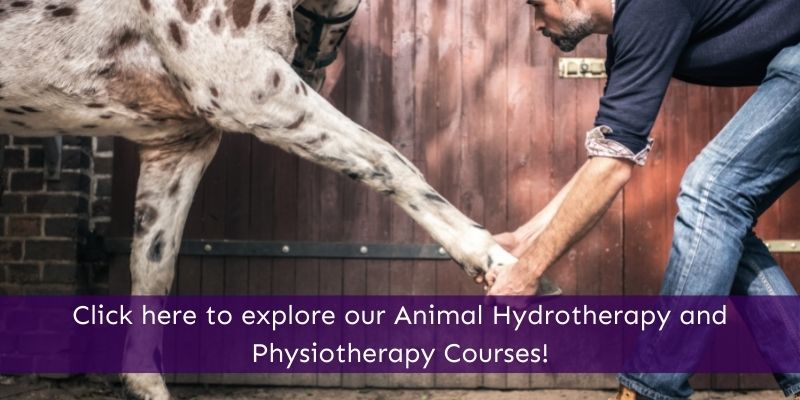What is an Animal Physiotherapist?
An Animal Physiotherapist is often known as a Veterinary Physiotherapist. They are qualified professionals with a degree or Level 6 qualification in treating animals with physical conditions. Unlike other Animal Hydrotherapists, Veterinary Physiotherapists can treat animals on land and use a range of techniques and equipment to improve their health and wellbeing.
Which animals do Animal Physiotherapists help?
Animal Physiotherapists work on a variety of small and large animals and a broad selection of species. For example, some Veterinary Physiotherapists have specialist training in Equine sport, treating racing horses for sport-related injuries. Other Veterinary Physiotherapists focus on small animals such as dogs and cats and will have a portfolio of animal patients that they tend to.
Physiotherapy is a type of treatment available through a Vet. A referral can happen when a Veterinary Professional believes the animal requires additional rehabilitation. Animals may need a referral due to an injury, or a physical ailment or after surgery. Eligible referrals might include:
- Physical pain
- Muscle regeneration
- Arthritis
- Hip dysplasia
- Sprains and strains
- Fractures and broken bones
- Sporting injuries
- Post-surgery recovery
- Biomechanics
- Cruciate ligaments
- Athletic ability
- Severe weight gain or weight loss control
- Osteochondritis Dissecans (OCD)

Where do Veterinary Physiotherapists work?
Veterinary Physiotherapists have flexible options when it comes to their place of work.
Some Physiotherapists are associated with Veterinary Surgeries and are employed directly. Some Veterinary Physiotherapists are self-employed.
They can run a small animal business and operate as consultants for a variety of private animal patients. Alternatively, a Physiotherapist can be stationed at a horse stable or Zoo, looking after a range of large animals.
What is a working week like for a Veterinary Physiotherapist?
Luckily, Physiotherapists have the option of working part-time or full time. However, they may need to work emergency appointments or be on call on weekends. Physiotherapists tend to have good physical fitness and have great stamina. And may need to lift heavy animals or move them into positions for treatment.
How do you become qualified as a Veterinary Physiotherapist?
In the past, Veterinary Physiotherapists had to attend University and obtain a degree in Veterinary Physiotherapy or Human Physiotherapy. However, it is now possible to study one course and gain practical training in Animal Hydrotherapy and Veterinary Physiotherapy.
Evidence of hands-on training and clinical practice is essential for this role. Candidates must have proven experience working with animals to provide hands-on care.
Veterinary Physiotherapists also need to continue professional education and development (CPD) and will need to ‘top-up’ their training by attending lectures, webinars and studying further courses and qualifications.

How much does a Veterinary Physiotherapist earn?
The salary of a Veterinary Physiotherapist very much depends on their experience and training. However, a starting salary would expect to begin at £18,000 per year with the potential to reach £25,000 for an experienced professional. A Senior Veterinary Physiotherapist with several years of clinical practice could earn up to £65,000 a year. Physiotherapists traditionally charge by the hour for their services, which can be between £25-£75 for treatment for an animal.
Again this varies depending on the experience level of the Physiotherapist, the animal patient, and the equipment available. For example, a Physiotherapist with Hydrotherapy training can offer treatments in water and on land.
Can Veterinary Physiotherapists specialise in a specific field?
Veterinary Physiotherapists can have a broad range of skills and obtain different qualifications in rehabilitation and therapy. For example, they could expand their practice to specialise in respiratory or neurological conditions. There are even more niche areas such as animal weight control, obesity, and nutrition.
What type of treatments do Physiotherapists use on Animals?
A Veterinary Physiotherapists would typically treat an animal on land and use a range of rehabilitation techniques to improve their physical condition. They may use massage techniques to treat a specific muscle group or practice strength training, conditioning exercises and controlled exercise.
Using specialised equipment for treatment is also essential for a Physiotherapist. Electrotherapies like laser therapy can involve electrophysical agents such as thermal and ultrasound. An experienced physiotherapist can conduct advanced gait analysis and create a treatment plan for the animal’s specific needs.
How do I become a Veterinary Physiotherapist?
Recent changes in the animal therapy industry have made it possible for students to obtain a qualification at Level 6 in Veterinary Physiotherapy without attending University.
The Level 3 Diploma in Small Animal Hydrotherapy + Level 6 Diploma in Veterinary Physiotherapy with Hydrotherapy is available for anyone aged 18 or over. This Ofqual regulated qualification includes 5 days of practical training at hydrotherapy centre, 25 days of physiotherapy training, and 800 hours of clinical practice.
This qualification is perfect if you have a passion for animals and want to treat animals on land and in water as a qualified Veterinary Physiotherapist and Hydrotherapist. This course also allows you to study the course at your own pace and offers practical training that is local to you.
You can enrol on this course at any time of year and study at your own pace.
Visit the course page here for more information. If you would like to know more about Veterinary Physiotherapy or Small Animal Hydrotherapy please speak to one of our careers advisors on our website to discuss training options that are suitable for you.

















